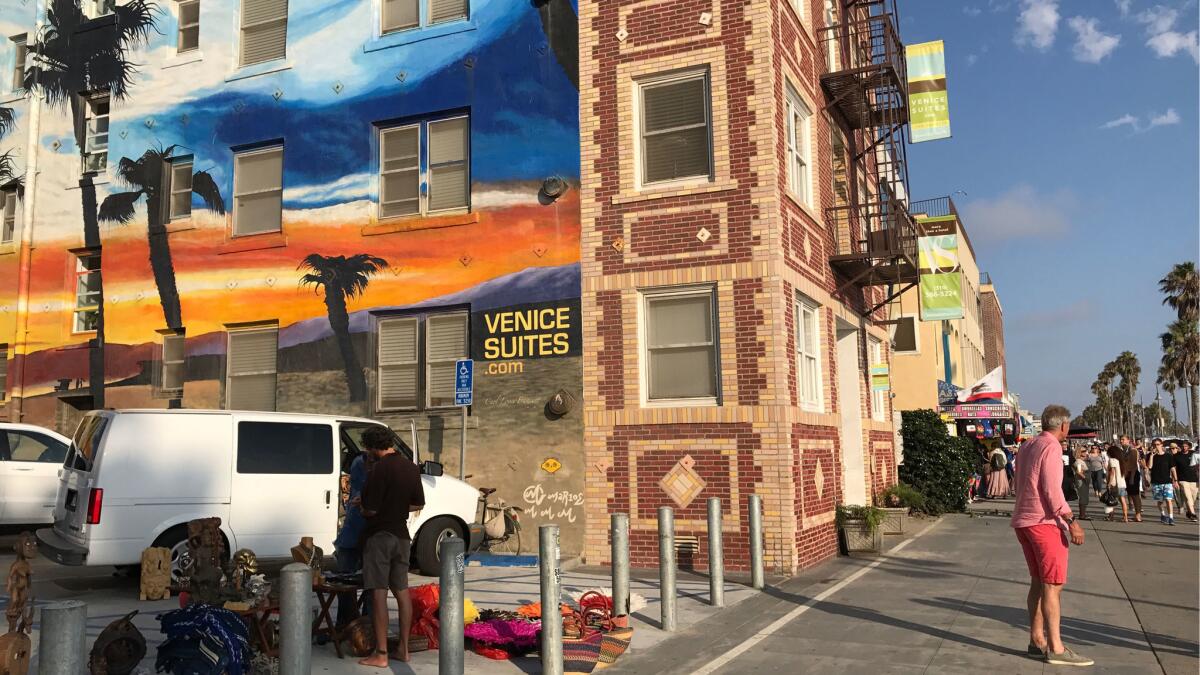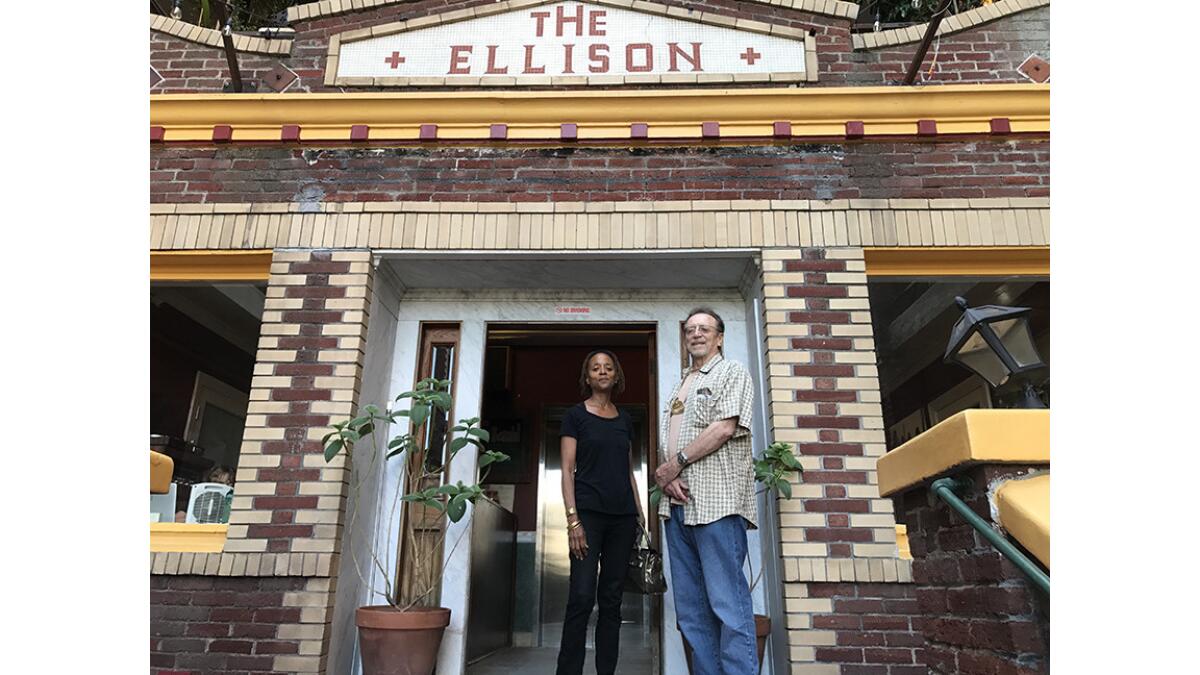California Journal: Venice has become an epicenter of Los Angeles’ struggle over short-term rentals. Call it the Airbnb problem
On any summer weekend, Venice Beach is the ultimate urban beach carnival: exhilarating, loud, funky and diverse. No wonder Ocean Front Walk is one of the state’s premier attractions: It’s amazing entertainment and it’s 100% free.
But unlike other tourist spots — say Disneyland or Universal CityWalk — Venice is still primarily a residential neighborhood. Because of that, Venice has become an epicenter of Los Angeles’ struggle over short-term rentals, what you might call the Airbnb Problem.
To get a sense of it, I took what some local housing activists have dubbed a “Lost Housing” tour of Venice on Saturday afternoon. Over the course of four hours, I visited half a dozen buildings on or very close to the Boardwalk that have been converted, without permits, from long-term rental apartments to short-term rentals, or — yes — let’s call them what they really are: hotels.
If you are wondering why the rental housing market in a place like Venice Beach is so tight, look no further than your nearest laptop. Fire it up and find dozens of websites advertising hotels and houses “just steps from the sand.”
These places, by the way, are not extra rooms, guest houses or homes offered by the owners who want to cover part of their summer trip to France. They are apartment houses and entire homes that have been converted to short-term rentals by displacing long-term tenants.
InsideAirbnb is a website that tracks how Airbnb impacts city rental stock. It estimates that at least 76% of Airbnb rentals in Venice (or 1,582 out of 2,085 listings) are entire homes or apartments, which means, essentially, that those units have been removed from the rental market at a moment when the city’s housing shortage is Topic A on the lips of every politician.
(The number of converted units is almost certainly higher because not every “hotel” that has been converted from an apartment house uses the Airbnb platform.)
I hate to break it to fans of Harry Perry, the turbaned, roller-skating bard of Venice Beach, but the noise of rolling suitcases threatens to supplant his wailing guitar as the soundtrack of Ocean Front Walk.
::

My tour began at the Ellison, at 15 Paloma Ave. It’s an early 20th-century brick apartment house, with two buildings side by side, exterior hallways and spectacular views of the water.
Renters used to occupy all of the Ellison’s 57 rent-stabilized units. Now, about 12 of them are left, holdouts in a building cited by the city of Los Angeles for an illegal hotel operation. (The building’s owner, Lance Robbins, is vigorously contesting the complaint.)
A few blocks south, on Ocean Front Walk, we popped into Venice Beach Suites, a 30-unit rent-stabilized apartment house whose rooms are now occupied by tourists and travelers. “Are there any apartments available here?” someone asked the desk clerk. “No,” he replied. “This is a hotel. No stays longer than 21 days.”
On Rose Avenue, near the southern border of Santa Monica, I walked into two places. Air Venice used to have 59 rent-stabilized apartments. It is now a hotel. The other, the Rose Hotel, also used to be an apartment house, with 25 rent-stabilized apartments.
One of my guides, Bruce Kijewski, 68, has lived in the Ellison for 40 years. He pays $1,640 a month for his 450-square-foot apartment, a corner unit on the fifth floor with spectacular views of the ocean and mountains.
In the past few years, Kijewski said, the landlord has rid the place of tenants — either by attrition or eviction — in order to create “The Ellison Suites,” a tourist hotel.
Housekeepers with cleaning carts roam up and down the hallways; people with suitcases arrive and depart in a constant stream. The remodeling noise is constant, and the landlord regularly hosts amplified concerts in the interior courtyard, which Kijewski believes act both as an draw for tourists and a way of torturing tenant holdouts like him.
“It’s deliberate, militarized chaos,” said Kijewski. “They use noise as a weapon to try to get us out.”
Apparently the tourists don’t like it that much either. The Ellison’s Yelp reviews are atrocious.
::

It has taken groups like Keep Neighborhoods First years to light a fire under city officials. “I’ve always been involved in human rights issues,” said the group’s co-founder Judy Goldman. “Housing is such a fundamental human right.”
Two years after it began looking at ways to control short-term rentals, the Los Angeles City Council has still not adopted an ordinance to regulate them. A draft ordinance has been hammered out, but it’s not clear when the City Council will vote, or how such rentals will be limited.
Last year, City Attorney Mike Feuer filed civil cases against two Venice landlords, among others, alleging they are illegally operating hotels that should be rental housing.
“In a city with a profound shortage of affordable housing, unlawfully converting rental units to operate hotels has got to stop,” Feuer said at the time. “My office will continue to intervene to keep rent-stabilized units on the market and hold owners accountable for not complying with the law.”
The cases have not been resolved.
One of the defendants, Andy Layman, 69, owns the aforementioned Venice Beach Suites on Ocean Front Walk near the famous Venice Skate Park. He has operated it as a hotel for years, claiming that was its original use when it was first built in 1912. In 1986, he bought the building out of foreclosure, figuring that, with 40 feet of Boardwalk frontage, it would be worth something one day. Even then, it had been an apartment house for decades.
All his tenants eventually left voluntarily, he said, and he began investing money to create what his website describes as “a boutique hotel offering 24 fully-furnished queen-bed studios with mini-kitchens & private bathrooms and exposed red-brick walls & hardwood floors in the heart of Venice Beach.”
Unlike some of the other landlords the city is going after, said Layman, “I am a small, independent mom-and-pop operated property. It’s the only property I have.”
Maybe so, but he turned his apartment house into a hotel, and only asked for permission after the city sued him.
::
I called Roy Samaan, a research and policy analyst for the Los Angeles Alliance for a New Economy, a progressive outfit that pushed hard for a city minimum wage increase in 2015. Also that year, Samaan wrote a deeply researched report on the ill effects that short-term rentals were having on neighborhoods in Los Angeles.
I asked him the obvious obnoxious question: Venice is expensive now. Why shouldn’t landlords be able to get rid of rent-stabilized tenants in order to maximize profits?
There are two answers, he said. The first one is practical, the second existential.
First, the city has developed processes — neighborhood councils, hearings, permits, etc., — that are meant to govern land use. You can’t just take a rent-stabilized apartment house off the market because you feel like starting a hotel.
As to the second issue: “It comes down to why people want to go to Venice in the first place,” Samaan said. “There’s a lot of coastline but Venice is a hot spot, it’s unique, and you have to ask why. If we continue to lose affordable housing and move people out, you change what makes Venice Venice.”
Twitter: @AbcarianLAT
ALSO
Parking on an L.A. parkway? Prepare to be ticketed
L.A. to make sure air filters are being installed in homes near freeways
Wealthy San Francisco neighborhood loses gated street in tax auction
Sign up for The Wild
We’ll help you find the best places to hike, bike and run, as well as the perfect silent spots for meditation and yoga.
You may occasionally receive promotional content from the Los Angeles Times.




